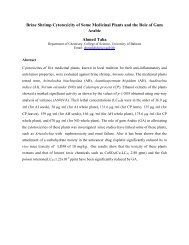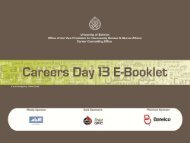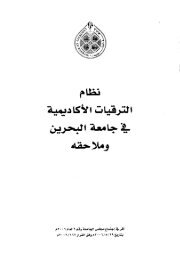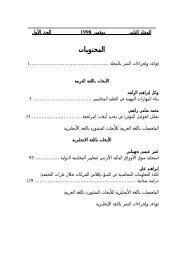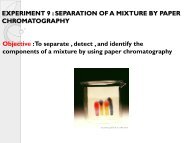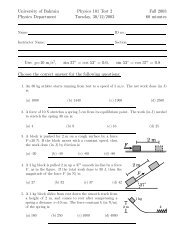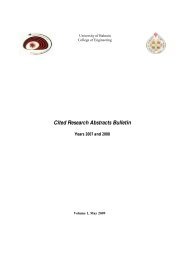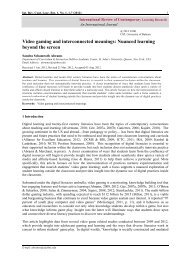د. ÙÙا بÙت عÙ٠اÙÙعÙ٠٠د. ÙÙÙÙÙÙÙÙادر ÙاظÙÙÙÙÙÙÙÙ٠د. ج٠ا٠... - جا٠عة اÙبØرÙÙ
د. ÙÙا بÙت عÙ٠اÙÙعÙ٠٠د. ÙÙÙÙÙÙÙÙادر ÙاظÙÙÙÙÙÙÙÙ٠د. ج٠ا٠... - جا٠عة اÙبØرÙÙ
د. ÙÙا بÙت عÙ٠اÙÙعÙ٠٠د. ÙÙÙÙÙÙÙÙادر ÙاظÙÙÙÙÙÙÙÙ٠د. ج٠ا٠... - جا٠عة اÙبØرÙÙ
Create successful ePaper yourself
Turn your PDF publications into a flip-book with our unique Google optimized e-Paper software.
2 0 1 1<br />
196<br />
in political philosophy as well as political<br />
activism, and the latter would supposedly derive<br />
its principles from the former. To elaborate this<br />
point, a good place to start would be to look at<br />
Paul’s contemporariness in terms of Badiou’s<br />
thought by looking at the problematic that<br />
Badiou has tried to tackle through this book.<br />
Rightly so, Badiou has detailed this in the first<br />
chapter of the book in the context of discussing<br />
Paul’s contemporariness. He admitted that he<br />
embarked on a philosophical investment of<br />
Paul, who at first sight would seem distant from<br />
the possibility of such an investment. Badiou,<br />
however, saw a profitable engagement here,<br />
precisely because the centrality of a fabulous<br />
event (Christ’s resurrection) in Paul’s thought<br />
provided a proper mediation for “restoring the<br />
universal to its pure secularity, here and now”<br />
(p. 5).<br />
To explain what Badiou meant by restoring the<br />
universal to its pure secularity, it is important<br />
to remember his open contempt for relativism.<br />
Badiou wrote this book in 1997, at a time when<br />
the Marxist ‘universal’ project has declined.<br />
He was also at odds with the postmodern<br />
thought that yielded to the complexity of the<br />
human condition and has given up on the<br />
great narratives. Badiou, as Zizek puts it, is<br />
still “aiming for, against the postmodern doxa,<br />
(...) precisely the resuscitation of the politics<br />
of (universal) Truth in today’s conditions of<br />
global contingency.” (Zizek Ticklish 132)<br />
Being a staunch post-Marxist he had a great<br />
interest in finding new possibilities of political<br />
resistance to the project of capitalism.<br />
It is possible to see how Paul fitted into the<br />
development of Badiou’s project of trying to<br />
recover the ‘question of truth’ from cultural<br />
and historical relativism, and ‘resisting’ the<br />
current of “moral philosophy disguised as<br />
political philosophy” (Being and Event xi), as<br />
he lamented in his introduction to the English<br />
translation of Being and Event.<br />
The relevance of Paul to our time, in Badiou’s<br />
view, couldn’t be greater, for he (i.e. St<br />
Paul) has taken the risk of “assigning to the<br />
universal a specific connection of the law<br />
and the subject,” (7) and not without a price<br />
paid by the law (the Jewish and Philosophic<br />
laws being suspended) and the subject (the<br />
traditional Jewish subject abandoning the<br />
status of being one of the chosen, and the<br />
pagan subject submitting to an event that<br />
cannot be proved).<br />
The Christ Event and the Pauline<br />
Subject<br />
According to Badiou, the subject is constituted<br />
only by its active fidelity to the event of truth.<br />
Paul’s uncompromising fidelity to the event of<br />
Christ’s resurrection, and his insistence, that<br />
faith in it alone was enough to constitute the<br />
subject/follower of the ‘new way’, has both<br />
defined his discourse and caused him much<br />
trouble in defending it.<br />
Paul’s conflict with the more observant<br />
Judeo-Christians, who wanted all believers<br />
to be circumcised, was seen by Badiou as a<br />
tension between the potential universality of<br />
the ‘postevental’ truth (the truth inferred by<br />
the belief in Christ’s resurrection) and the<br />
eventual site itself, which was located in a<br />
singular situation (the Jewish tradition). Paul<br />
has succeeded, after his famous meeting with<br />
the historical apostles in Jerusalem (probably<br />
head by Peter), to bind the singularity of the<br />
new faith, with the universality of its message.<br />
He refused to accept circumcision as a mark<br />
of the Christian subject, like it was the mark<br />
- 5 -






